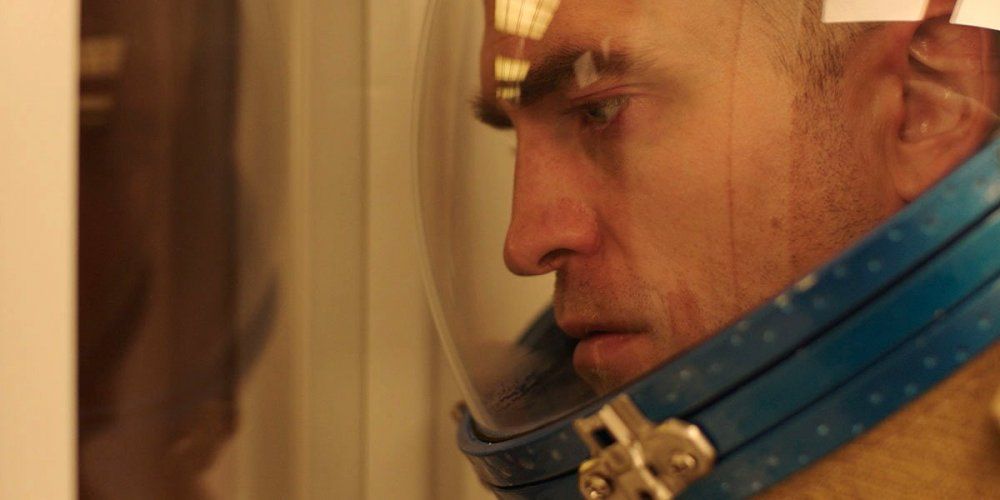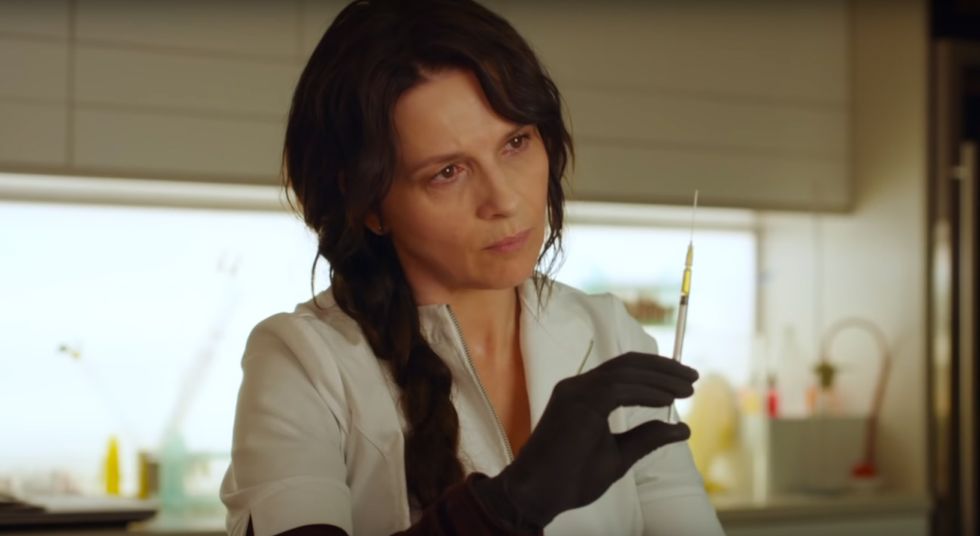In space, you can still hear your baby scream. “Please, please stop it!” whimpers Robert Pattinson’s intergalactic castaway in an early scene from High Life, as his infant daughter unleashes another lung-busting, ear-piercing wail. And us parents of young children back on Earth nod along sympathetically. We’ve all been there, Bob.
That’s about as high as the relatability factor goes, because unless you’ve also murdered someone in an argument over a dog, or been exiled into space as part of a science experiment, or had your sperm harvested by Juliette Binoche, or all of the above, you probably won’t have an awful lot of fellow feeling for Pattinson’s character here. No matter, sit back and enjoy the ride. Binoche seems to.
Much of the attention on High Life— and there’s bound to be plenty — will focus, quite understandably, on Binoche and her “fuck box”. Binoche here delivers a triumphant, defiant, unbuttoned performance. She plays a woman with a terrible secret — a sort of Space Medea, with sinister hair — who is a mother superior of a very particular sort, on a cargoship/prison/laboratory that is speeding through space, destination unknown. Her shipmates are a striking looking crew of racially diverse young psychopaths. “Recycled scum,” she calls them. But then she’s a bit like that. Her mission, as she sees it, is to create new life, by force if not by consent.
The scene that will live longest is one in which Binoche enters a room — yes, yes, YES, it’s the fuck box — slides a condom on to a metallic dildo, places her hands in overhead straps, mounts a pivoting contraption of some sort and indulges in an epic wank. This is perhaps less erotic than it sounds. (Does it even sound erotic?) Much of the camerawork, as Binoche writhes ecstatically, is focussed on some dramatic scar tissue on her stomach. The music is doomy. It’s a sex film, but it’s not very sexy.
On the other hand, Binoche gets some winning one-liners. Well, she gets two. Two one-liners. “I’m totally devoted to reproduction.” “Douching is for amateurs.” So chic. So French!
High Life— the title is shared with the BA inflight magazine; I don’t think this is intentional, though veteran cabin crew may find resonances — is the work of the French writer-director Claire Denis, a filmmaker of almost surreal unpredictability. The last time she worked with Binoche, it was on the heart-warming midlife romcom, Let the Sunshine In (2017), in which the masturbation — because certainly there must have been some — happened off-screen.
The new film, then, is a Tarkovskyan dystopian sci-fi, wantonly bleak, with moments of gruesome violence and very little in the way of consoling humour. (There is one amusing in-joke, in that Pattinson’s character, Monte, is the only space passenger who chooses not to use the fuck room; the actor, you’ll recall, became famous as the celibate vampire Edward Cullen. “I choose abstinence over indulgence,” says Monte. That’s perhaps the only line in the film that could equally have been used in Twilight.)
So barking mad is High Life— there are dogs in space, too, it turns out — that one suspects it could hardly have been made were it not for the presence of Pattinson among its cast. Hollow eyed, crew-cut, with a soft, hillbilly lilt to his voice, he delivers a performance of quiet restraint. He is the calm centre of a film which seems constantly on the brink of spinning out of control. And without his ever seeming to want to dominate proceedings, your eye is unfailingly drawn to him.
There is a danger, when bankable young stars use their influence to make challenging art films, of overpraise. Often the results are precious, pretentious, empty. Words like “courage” and “daring” are employed to describe what are self-regarding, sophomoric efforts, as pampered millionaires fit a few weeks of pretending to be a homeless abuse victim with PTSD around commercial commitments for luxury brands and promotional duties for Marvel blockbusters. They do it for the kudos, before putting their superhero suits back on for the payday.
Not so, in Pattinson’s case. He has consistently chosen to take on difficult material, and said no to what one can only assume are the daily offers he must receive for starring roles in megabucks productions.
Pattinson, of course, was burned by early fame. It’s more than a decade now since he found a life-limiting level of celebrity as the brooding lead vampire in the Twilight movies. He was in five of them, alongside Kristen Stewart, who became his real-life girlfriend, before they split up in a blaze of prurient publicity. We called him R Patz, back then, and made his life miserable.
But he used his position to make interesting and arresting films. (So has Stewart, for that matter.) We first profiled him in Esquire in 2014. He was 28 then, no longer the pale heartthrob of the Young Adult years, and promoting a film called The Rover, written and directed by the Australian filmmaker David Michod. That was another dystopian thriller, set in the aftermath of apparently cataclysmic event known as the Collapse. Pattinson played a young man abandoned to die by the side of a road in a desolate, lawless Outback town. Filthy, desperate, corruptible, bleeding from a gunshot wound to the stomach, he is rescued by Guy Pearce’s taciturn sharpshooter and driven at speed towards his ugly fate. If this was a deliberate attempt to distance himself from his teenybopper past, it worked.
Since then Pattinson has worked with David Cronenberg, on the Hollywood satire, Maps to the Stars. As the photographer Dennis Stock in Anton Corbijn’s Life. With James Gray on The Lost City of Z. He played TE Lawrence, no less, for Werner Herzog, also no less, in Queen of the Desert. It would be fair to say that not all of these films were unqualified successes. Don’t beat yourself up if you missed one. But nothing ventured, nothing gained: Good Time, the Safdie brothers’ gritty New York crime drama (for which he sat for his second Esquirecover, in 2018) was much more compelling, and Pattinson won admiring notices for it, as he should for High Life.
There’s more to come: The King is David Michod’s Henry V, with Timothee Chalamet in the title role and Pattinson as the French Dauphin; The Devil All The Time is an adaptation of Donald Ray Pollock’s lurid gothic novel; Waiting for the Barbarians, from the JM Coetzee novel, also stars Johnny Depp and Mark Rylance; The Lighthouse has Willem Dafoe as a Maine lighthouse keeper called Old. (Perhaps Pattinson plays Young?) There’s a project with the British filmmaker Joanna Hogg. All classy, all credible, not one of them a sure-fire box office success or anything like it.
One has to hope that, for all this admirable questing, at some point Pattinson will agree to make a film for a big audience. Happily it looks like he will take a part in the next movie from Christopher Nolan. Perhaps it’ll be another of Nolan’s splashy sci-fis, like Inception or Interstellar, that manages to be spectacular and popular. Probably won’t have a fuck box, though.
High Life is released on 10 May.














